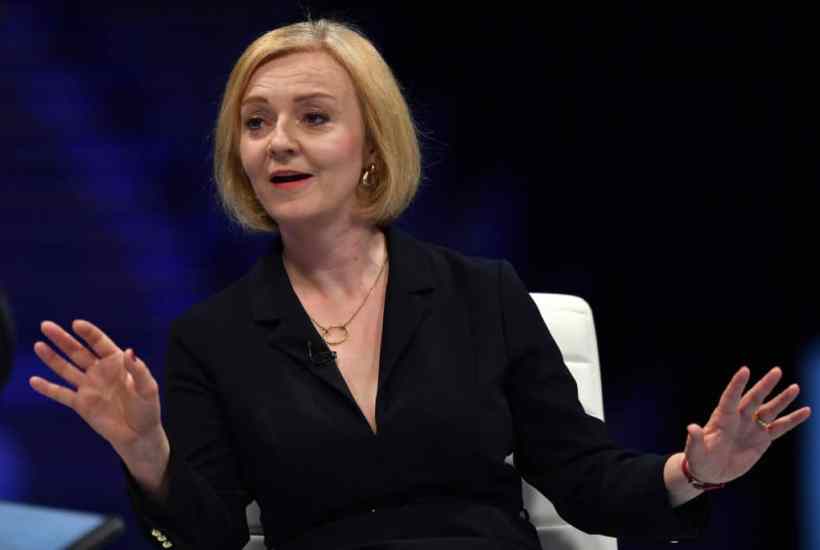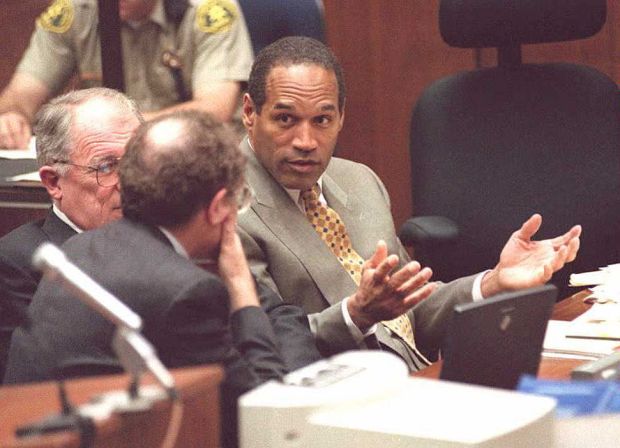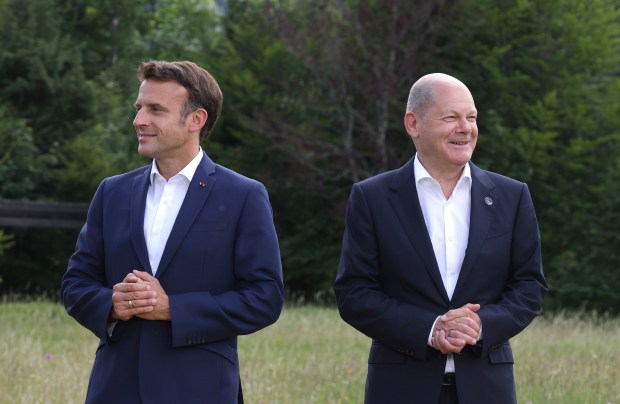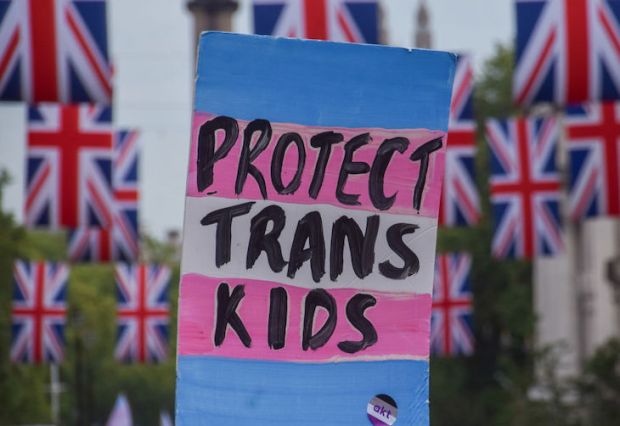The wheels are coming off the Conservative party. In recent days, in the polls, the party averaged just 31 per cent of the national vote. This is John Major in 1997 territory, or William Hague in 2001, both of whom were humiliated at the ballot box. Britain’s governing party is now in the fast lane toward electoral wipeout.
In fact, remarkably, half the people who voted for the party only 989 days ago have now abandoned it. This has given Keir Starmer and the Labour party a commanding 11-point lead. Meanwhile, the share of voters who think the next election will deliver another Conservative majority has collapsed to just 19 per cent.
And they are right to think this way. Were the numbers in the polls replicated at the next general election then the result would be a commanding Labour majority: the party’s first for nearly two decades.
Look under the bonnet and it is not hard to see why this is happening. The only reason why, in 2019, the Conservatives were able to win their biggest majority since Margaret Thatcher’s third and final majority is because they connected strongly with specific groups of voters: Brexiteers, pensioners, workers, non-graduates.
Promises to Get Brexit Done, Take Back Control of Britain’s borders, and Level-Up the country, all delivered through Boris Johnson’s charisma, put the party’s support among these groups on steroids.
But since last autumn, as the party lurched from one crisis to another, many of which were entirely self-inflicted, this coalition has steadily unravelled. While Boris Johnson won three-quarters of all Brexit voters his party now only holds half of them; while he won more than two-thirds of pensioners his party now holds fewer than half of them; and while he won over more than half the country’s skilled, semi-skilled and unskilled workers his party now holds only one in three of them.
There is simply no way the Conservative party will hold the Red Wall with these numbers. Across the Midlands, one of its strongest regions in 2019, its support has crashed by nearly 30-points. Across the North, its support has collapsed by nearly 20 points. And in both these regions, central to the Brexit realignment, the Conservatives now trail Labour by at least 20-points. Labour, in other words, is slowly but steadily re-establishing its control over the Red Wall and while saying very little at all. Oppositions don’t win elections, governments lose them.
The nightmare scenario for the Conservative party — as I warned Number 10 — is they not only lose the Red Wall but a large chunk of the Blue Wall, too. Such a pincer movement would leave them with nowhere to go, potentially ushering in a defeat on the scale of 1997 or 2001.
And so they had to make a choice; they either ‘lean in’ to the realignment, doubling down on the core voters who put them into power, or they try to be all things to all voters and please nobody at all. Catch-all strategies only work when most people share the same view about the dominant issues of the day; they do not work in contexts like Brexit Britain where, even today, voters remain sharply divided by their values, their identity, and their vision of how they think Britain ought to be. In these contexts, parties and leaders, ultimately, need to pick a side.
The Conservatives are now dealing with the electoral consequences of trying to be all things to all voters. And this was made worse by how — through one scandal after another, one lockdown party after another – they routinely violated something that lies at the very heart of what it means to be from these islands: our sacrosanct sense of fair play. Given that it was the populists who claimed to be on the side of the people who ended up treating the people with such contempt the backlash among voters was always going to be fierce and unforgiving. And now the party is feeling the full force.
Since 2019, the share of voters who think the Conservatives ‘are serving their own interests’ rather than ‘trying to do the right thing’ has surged from 36 per cent to 65 per cent. The share who say they are ‘untrustworthy’ has rocketed by the same amount. The share who think they are ‘incompetent’ has ballooned from 27 per cent to 59 per cent. The share who say they are ‘out of touch’ is up from 36 per cent to 67 per cent. The share who think they ‘only care about a select few’ has jumped from 46 per cent to 67 per cent. And the share who say they are ‘not close’ or ‘not close at all’ to the working-class has increased to 68 per cent. What began as a project to reshape Britain around a new agenda has morphed into one that is seen by most voters as elitist, out-of-touch, insular, and on the side of a privileged few.
This is why, today, the party is not just haemorrhaging support among its core voters who were central to the realignment but also those who have been trending away from conservatism ever since the Brexit referendum: liberal graduates, middle-class professionals, Millennials, and even younger Zoomers from Generation-Z.
Since 2019, the party’s support among Remainers and middle-class professionals has been slashed in half. Its support across non-London southern England has crashed by 20 points. Its support in London, already lost to the Tories, has slumped by another 14-points, making the capital completely impenetrable. Among Remainers, Londoners, young graduates, and minority ethnic voters, the Conservatives are not just trailing Labour — they have become an utterly fringe force, barely visible at all. Today, just six per cent of 18-24 year old Zoomers plan to vote Tory at the next election.
In the aftermath of the last general election, professor Andrew Gamble noted how one of the great puzzles in British politics is why the Conservative party has been so successful for so long. In the more than one hundred years between people being given the right to vote and the next general election the party will, remarkably, have governed Britain for 74 per cent of the time. The reason is reinvention. The Conservatives, unlike Labour, have always reinvented themselves to meet the mood of the moment.
But while in the aftermath of the Brexit referendum the Conservatives reinvented themselves once again to tap into the realignment they never really knew what to do with it, or where to take it.
Sympathisers will say the pandemic and then war in Ukraine blew them off course — that a project meant to be about national renewal became one about national salvation. But this is misguided. Franklin Roosevelt, Margaret Thatcher, Ronald Reagan, and Tony Blair all pushed through political realignments in the face of things such as the Great Depression, the Cold War, and international conflicts.
The reality is that the party has been far more constrained by its own internal logic. Conservative MPs and donors have always been far more economically and socially liberal than the far more culturally conservative voters they inherited from the Labour heartlands and Nigel Farage – many of whom also lean left on the economy.
The party’s southern MPs were always instinctively against Levelling-Up the north — especially when it became clear what this would actually entail. Many well-to-do one-nation types have always looked down on the cultural anxieties which unite their new voters as unsavoury ‘culture wars’ which are beneath them or risk damaging their own standing among the liberal establishment. And many True Blue Tories from SW1 and the Shires — raised on a diet of Thatcher, Hayek and Friedman — never really grasped the outlook that unites their new, post-2016 supporters.
As the evidence shows, many of these voters do not want to build a Davos-on-Thames where the state is completely rolled back, taxes are slashed, public services suffer and Britain is transformed into a globalist paradise that is even more dependent on mass immigration than it was before the Brexit referendum.
Most people who voted Conservative in 2019 want to raise, not lower, taxes on the wealthy, want to increase tax on big business, want to slash the rate of immigration, think Net Zero should be scaled back, think trans rights and gender ideology have gone too far, would happily bankroll the state if it meant a more efficient National Health Service, and think Britain should leave the European Convention on Human Rights — if that’s what is required to genuinely Take Back Control.
Unlike Conservative elites, they want to rebuild a nation where government is willing to intervene to make a rigged system fairer, where net migration is reduced to around 100,000 a year as opposed to 300,000, where Britain’s leaders will take unprecedented action to defend Britain’s borders, where the deck genuinely tilts away from London and the southeast toward everywhere else, where government will prioritise the interests of the national community over the interests of big business and globalisation, where their leaders are unafraid to promote Britain’s distinctive identity, history, and culture, and where the most important and influential institutions in the country — the media, civil service, universities, creative and cultural industries — are reformed to make room for a wider and more representative range of views and voices from the country.
Many of these voters care just as much about cultural freedom as economic freedom. Unlike in the 1980s and 1990s, they not only want to push back the frontiers of the European Union, the European Courts, and reform an inefficient state but also the creeping influence of progressive ‘woke’ authoritarianism.
The party’s failure to better reflect this side of the realignment is one reason why its numbers are in free-fall. On all the issues central to its victory less than three years ago the party is rapidly losing support. On its signature issue of Brexit, more than 60 per cent of the country and one in three Conservatives now say it is being managed ‘badly’. On immigration, more than three-quarters of the country and the Conservative electorate say it is being poorly handed. On crime, nearly six in ten Tories are unhappy. And on Levelling-Up, more voters now say a Labour government would do a better job than a Conservative one ‘regenerating areas outside of London and the South East’.
Worryingly, for Conservative HQ, while they are losing their core voters on core issues they also look adrift from much of the rest of the country. On many other issues that are now surging up the agenda, a huge void has opened between the people and the governing party. On the economy, more than three-quarters of the country and more than six in ten conservatives think it is being poorly run. On the cost-of-living crisis, the party now trails Labour by close to 20-points. And on healthcare, more than three-quarters of all people and more than six in ten Conservatives think the NHS is being badly managed and expect it to get even worse.
In fact, as I pointed out in the Sunday Times, the Conservatives no longer own any major issue at all – a remarkable fact for a governing party. For all these reasons, a Conservative party which was returned to power less than three years ago with its most impressive majority since Margaret Thatcher’s third and final victory is now staring into the abyss. Out of touch with the realignment, out of touch with its new voters, out of touch with the country, the party suddenly looks likes it has been handed a one-way ticket to electoral oblivion.
The challenge facing the incoming prime minister and his or her team could not be more daunting. If they are to survive and avoid the fate of John Major and William Hague, they will have to reconnect with the realignment, repair their relationship with their new voters, and restore their standing in a country that no longer appears all that interested in what they have to say, all while grappling with the most severe cost of living crisis for half a century. Good luck.
Got something to add? Join the discussion and comment below.
Get 10 issues for just $10
Subscribe to The Spectator Australia today for the next 10 magazine issues, plus full online access, for just $10.
Matthew Goodwin's article originally appeared on his substack page




















Comments
Don't miss out
Join the conversation with other Spectator Australia readers. Subscribe to leave a comment.
SUBSCRIBEAlready a subscriber? Log in